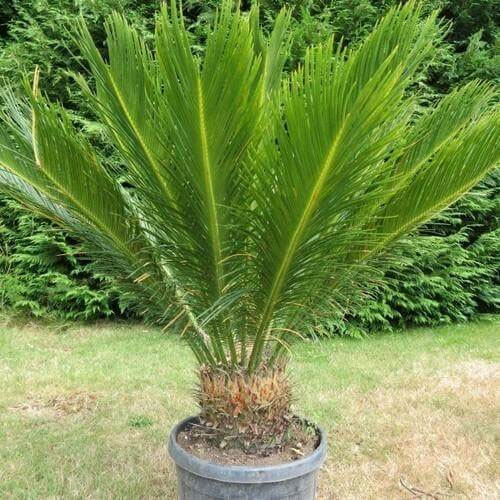Cycus Plam Plants
It seems like you're referring to Cycas plants, commonly known as cycads. Here’s an overview of these fascinating plants:
Characteristics:
- Scientific Name: The genus is Cycas. There are many species within this genus, including Cycas revoluta (sago palm) and Cycas circinalis.
- Appearance: Cycads have a prehistoric look with their stiff, feather-like leaves arranged in a rosette. The leaves are typically dark green and glossy.
- Trunk: They have a thick, cylindrical trunk that is often covered in old leaf bases. Some species have a more subterranean trunk.
Growth and Size:
- Height: Cycads vary greatly in size depending on the species. For example, Cycas revoluta typically grows 3-10 feet tall.
- Spread: The spread of cycads can also vary, but they generally have a compact, bushy appearance.
Growing Conditions:
- Light: Prefer full sun to partial shade. They can tolerate full sun but may need some protection in very hot climates.
- Soil: Well-drained soil is crucial. They prefer sandy or loamy soils and can struggle in heavy, clay soils.
- Watering: Water moderately, allowing the soil to dry out between waterings. Overwatering can lead to root rot.
- Temperature: Ideal for tropical and subtropical climates. They are not frost-tolerant and should be protected from cold temperatures.
Care:
- Fertilization: Feed with a balanced, slow-release fertilizer during the growing season (spring and summer). A fertilizer with micronutrients, such as magnesium and manganese, can be beneficial.
- Pruning: Remove dead or damaged fronds as needed. Pruning should be done carefully to avoid damaging the plant.
- Pests and Problems: Cycads can be susceptible to pests like scale insects, mealybugs, and spider mites. Regular inspection and prompt treatment can help manage these issues.
Interesting Facts:
- Longevity: Cycads are very long-lived and can remain in good condition for decades.
- Uses: While they’re often grown for ornamental purposes, some species, like Cycas revoluta, are also used in traditional medicine and for their starch content.
Cycads are a great choice if you’re looking for a distinctive and low-maintenance plant with a touch of ancient charm. If you have any specific questions about care or growing conditions, feel free to ask!


